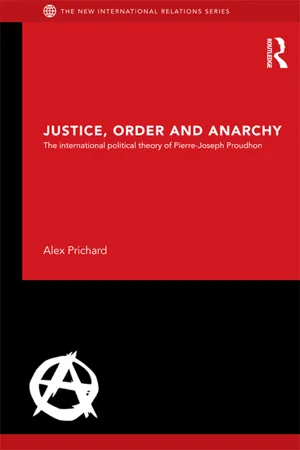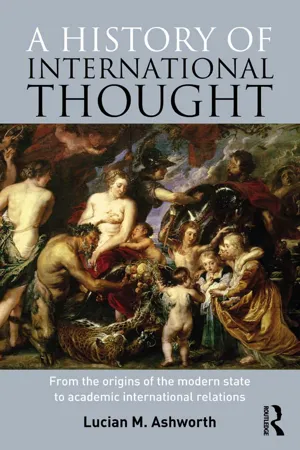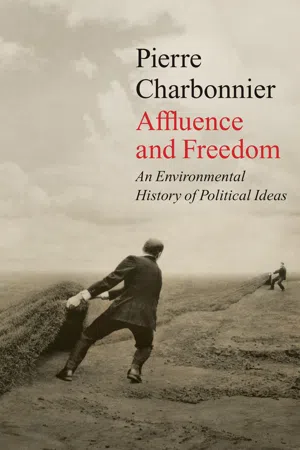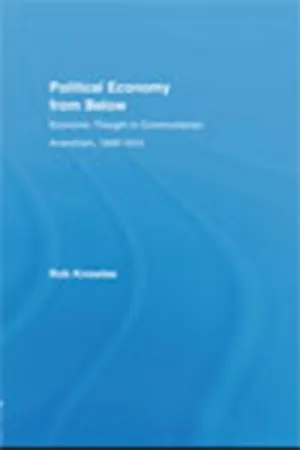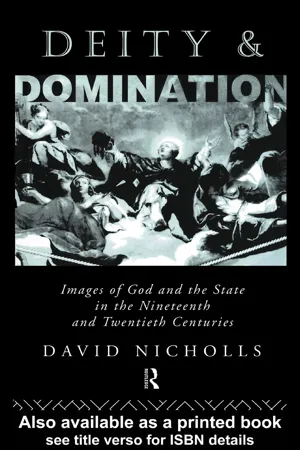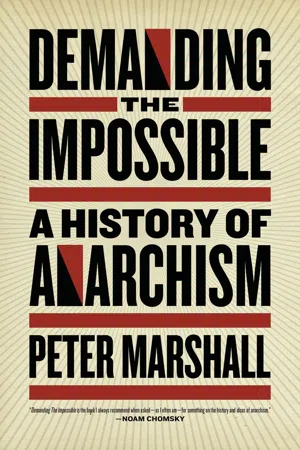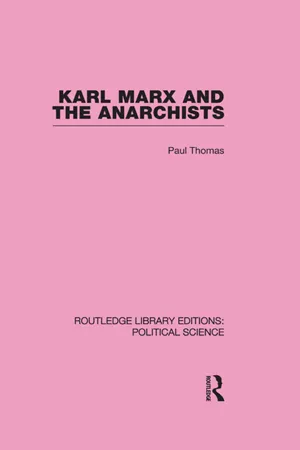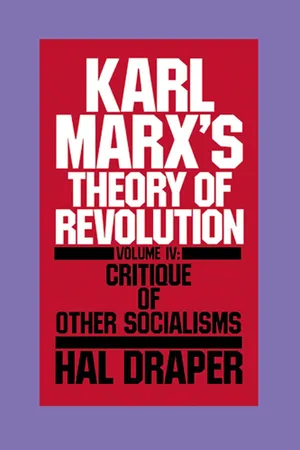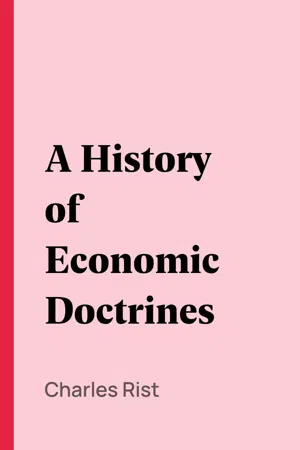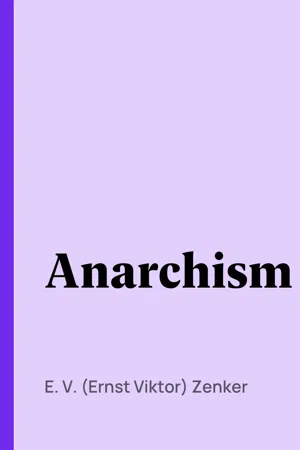Politics & International Relations
Pierre-Joseph Proudhon
Pierre-Joseph Proudhon was a French philosopher and politician known for his influential anarchist and socialist ideas in the 19th century. He is often referred to as the father of anarchism and is famous for his statement "Property is theft." Proudhon's works, including "What is Property?" and "The Philosophy of Poverty," have had a lasting impact on political and social thought.
Written by Perlego with AI-assistance
10 Key excerpts on "Pierre-Joseph Proudhon"
- eBook - ePub
Justice, Order and Anarchy
The International Political Theory of Pierre-Joseph Proudhon
- Alex Prichard(Author)
- 2013(Publication Date)
- Routledge(Publisher)
25 A particular notion of anarchy and a general fidelity to the state has become embedded and has ossified the intellectual contours of IR and political theory. Such is the dominance of the centrality of the state to most political and IR theory, and such are the effects of the marginalisation of anarchism, that attempts to craft critical alternatives to statism in IR and political theory routinely elide what an anarchist would take to be obvious. There is simply no general frame of reference for understanding how anarchism might have something to contribute to contemporary IR or political theory. Because of this lacuna, the exegesis I provide here is the primary contribution of this book.So who was Proudhon? Born in the middle of the Napoleonic Wars in the eastern French city of Besançon in 1809, the young Pierre-Joseph, the son of a cooper and cook, was raised in poverty and personal calamity. Post-war famine wreaked havoc on the region in 1817, and his father's business failed for refusing to profit from his customers (a moral conundrum that perplexed the young Proudhon). Pierre-Joseph was sent to school barefoot and without books, humiliated and belittled by his more affluent peers, he abandoned his baccalaureate at the final moment to help support the impoverished family. Eventually completing his schooling in 1827, he went on his first tour of France and on his return secured an elite apprenticeship as a typesetter for a local, but important press, publishing staple religious works alongside those of his radical local compatriot, Charles Fourier. His work nurtured his precocious intellect. He learned Greek, Hebrew and Latin, and developed a passion for philology. In 1838 he won a scholarship from the Suard foundation, allowing him to travel to Paris where he attended lectures by Jules Michelet (amongst others) and was immersed in the intellectual ferment of the Restoration period. - eBook - ePub
A History of International Thought
From the Origins of the Modern State to Academic International Relations
- Lucian Ashworth(Author)
- 2014(Publication Date)
- Routledge(Publisher)
65 Proudhon recognised an international problem (the destructiveness and arbitrariness of war) that could be solved by a political organisation based upon organic social and economic relations. Proudhon, living before the onset of mass globalisation at the end of the nineteenth century sees his economic organisations as rooted in the local, rather than being part of a globalised web of interactions.In Marx Against the Peasant Mitrany singled out Proudhon as one of the few socialists who understood the link between the peasantry and ownership of the land.66 Proudhon's support for private land ownership consisted of two parts. The first was his acceptance of the emotional attachment that labourers in general, and peasants in particular, had for the individual ownership of their possessions and land: ‘the more ground the principles of democracy have gained, the more I have seen the working classes, both in the city and the country, interpret these principles favourably to individual ownership’.67 Land ownership had value to the peasants in a way that was fundamentally different to the ownership of the land by landlords because the peasant related to the land directly through their labour. In addition to this emotive and non-rational reason for retaining private land ownership, Proudhon also had a progressivist and rational reason for favouring private land ownership: full collectivisation of the land would leave peasant farmers in a position little different from that under landlordism. Under landlordism the peasant cannot change their status, but is tied to the land through necessity and the need to pay high rents to a distant owner. Under collectivisation the authorities give ‘a longer lease and a lower rent’, but ‘my condition is incapable of change; here I am fixed for life and for the life of my children, attached to the soil’, because the peasant is unable to accumulate wealth through farming, and unable to use it to provide annuities in old age.68 What prevents the ownership of land becoming little different from capitalist ownership is the emotional bond. Mitrany was to develop this idea further through his own analysis of the peasant social revolution, but he was well aware that the core of this idea had been laid down by Proudhon a century before.69 Ideas of peasant land tenure formed the basis of a political economic system that was neither capitalist nor collectivist in its structure. This was the basis of Proudhon's concept of Mutualism, for which private possession could function as a revolutionary force in conflict with the ‘absolute right of the State’.70 - eBook - ePub
Affluence and Freedom
An Environmental History of Political Ideas
- Pierre Charbonnier, Andrew Brown(Authors)
- 2021(Publication Date)
- Polity(Publisher)
3 Proudhon is an author whose importance in the history of political thought deserves to be reconsidered.Property and labour
It has been said that the years between 1789 and 1848 constituted the ‘age of property’.4 Defined in the French Civil Code as the ‘right to enjoy and dispose of things in the most absolute manner, provided that one does not make a use of them prohibited by law or by regulation’,5 property was in fact conceived as the legal base of equality and liberty, i.e., as the practical condition of an equalization of conditions and a liberation of all from the servitudes affecting both human beings and the land under the ancien régime.It was in this context that the rigorous defence of property could appear to the young workers’ movement as the instrumentalization of revolutionary political grammar in the service of a new established order. Jurists at that time acquired significant intellectual prestige and high positions in the administrative apparatus of the various successive political systems. Characters such as Portalis, Troplong and even Jean-Baptiste-Victor Proudhon, a distant relative of Pierre-Joseph, exercised an almost unrivalled authority in the space of political thought. So they could, for example, reaffirm that ‘property and the law were born together and will die together’,6 and therefore equate public order with the maintenance of property. The jurist Belime wrote: ‘Once the principle of property is attacked in its legitimacy, the law itself is called into question, because it is on property that society, laws and even morality rest.’7 In 1848, Adolphe Thiers devoted a monumental study to the defence of this principle, in response to what appeared to him, too, as the most serious of all threats against the social and republican order.8 - eBook - ePub
- Rob Knowles(Author)
- 2013(Publication Date)
- Routledge(Publisher)
4 For as long as such historical caricaturing of Proudhon remains in place however, it represents a caveat over the way in which any discussion of his ideas can be carried out. This chaptermust first cut a path through the polemical and rhetorical thicket of caricatures in order to be able to perceive the man and his economic ideas as they manifested, for him, in his own time.One of the difficulties in carrying out this initial task is to engage with sufficient of his works in order to achieve the goal of this chapter. As Robert Hoffman5 has pointed out, Proudhon was a prolific writer. His published work is made up of ‘well over twenty thousand pages' and his unpublished writings comprise about two thousand more pages. The breadth of topics he discussed seems to be almost without limit. Not all of his work has been translated into English, although several of his major writings have been, the most prominent being What is Property? (1840), System of Economical Contradictions or, The Philosophy of Misery, Volume 1 of two volumes (1846), Proudhon's Solution of the Social Problem (1848), General Idea of the Revolution in the Nineteenth Century (1851), The Principle of Federation (1863), and a useful anthology edited by Stewart Edwards, Selected Writings of Pierre-Joseph Proudhon (1969).Substantial and important works which remain in the original French are De la création de l'ordre dans l'humanité, ou principes d'organisation politique (1843), De la justice dans la révolution et dans l'église: Nouveaux principes de philosophie practique adressés à son eminence Monseigneur Mathieu (1858), La Guerre et la Paix: Recherches sur le principe et la constitution du droit des gens (1861), De la capacité politique des classes ouvrières (1865), Du principe de l'art et de sa destination sociale (1865), and of course Volume 2 of his Système des Contradictions Économiques ou Philosophie de la Misère (1846). In addition, there are several collections of his works still in the original French, most incomplete, but each containing valuable material.6 For the purposes of this study, although there is a substantial amount of material in the English translations, it has been necessary to refer to the French material on many occasions in order to be certain that significant ideas are not overlooked. This applies not only to Proudhon's writings but to the excellent supporting notes and introductions which accompany some of the French collections.7 As Hoffman observed, ‘Proudhon is familiar to very few, especially outside of France, and those acquainted with him at all usually know too little of the variety of his ideas.’8 The work which eventually brings together Proudhon's economic idea of mutualism and its federalist counterpart is his De la capacité politique des classes ouvrières.9 - eBook - ePub
Deity and Domination
Images of God and the State in the 19th and 20th Centuries
- David Nicholls(Author)
- 2003(Publication Date)
- Routledge(Publisher)
Qu’est-ce que la propriété? He enthusiastically supported the revolution of 1848 and for a time was a representative in the assembly, where he managed to alienate almost all his fellow deputies of the right and the left. Proudhon edited a series of newspapers and founded a bank, but soon got into trouble with the government of Louis-Napoleon and took refuge in Belgium.On his return to France in June 1849 he was imprisoned for three years, but continued to produce important works including his massive book De la justice dans la révolution et dans l’église and one of his most important books, Du principe fédératif His health declined and he died in 1865. Other works were published posthumously including his notebooks and correspondence.Central themes running through the writings of Proudhon are those of justice and liberty. Although, like other socialists of his time, he laid considerable emphasis upon equality, it was always in his case related to liberty and justice. This respect for freedom led him to embark upon a sustained assault on every form of coercive authority and a searching criticism of all claims to moral authority.From Deism to Anti-TheismProudhon was fascinated by the idea of God. ‘Seized since childhood with that great idea’, he wrote ‘I felt it overflowing within me and dominating all my faculties.’59 Much of his social and political critique is couched in theological terms and is frequently consistent with Christian faith. He denounced the idolatry practised by the bourgeois classes of his day. Property he declared to be ‘the last of the false gods’. By property he meant not personal and family possessions, which he fiercely defended, but the existence of rented land and accumulated capital. Property reaps without labouring, harvests without sowing, consumes without producing; unlike the idols known to the psalmist who ‘have hands and handle not’, property has hands and grasps. It has achieved a sacred status in capitalism; as with the ark of old, no alien hands must be laid on it. Property produces wealth for its owner without his working, and can indeed be said, like God, to create ex nihilo. Idols were not, however, the exclusive possession of the bourgeoisie; the masses too had their false gods. ‘Like Israel in the desert, they improvise gods when no one has taken the trouble to provide them.’ Proudhon listed the great revolutionary figures of the past, Danton, Marat, Robespierre, Napoleon, up to his particular bête noire, the Italian nationalist Garibaldi. Do not touch their anointed, or they will treat you as sacrilegious.’60 - eBook - ePub
Demanding the Impossible
A History of Anarchism
- Peter Marshall(Author)
- 2010(Publication Date)
- PM Press(Publisher)
79The fundamental unit of society would remain the commune in which mutualist associations of property-owning and independent workers exchanged the products of their labour and organized their relationships through free contracts which are bilateral and based on equal exchange. Agricultural production would be based on the family, although Proudhon recognized the possibility of large industrial associations working as well as small ones.Society however would still be arranged from the bottom up. The largest units within the federation would be assigned the fewest powers and the smallest ones the most. The higher levels would also be subordinated to the lower ones. Each unit of society would be sovereign and have the right to secede from the federation. Delegates would be sent to the federal assembly, while officers of the federal authority would be recallable and the authority itself would withdraw as soon as it had accomplished its specific task.Proudhon argued that such a federal system is the very reverse of hierarchy or centralized administration and government. Nevertheless, it becomes clear that in order to resolve disputes, parties would have to submit to the authority of an independent arbiter. For the political contract to be binding, the citizen must abandon a degree of liberty in order to attain the special object for which the contract is made, namely to ensure that they keep to their contracts. While Proudhon denies that such an authority amounts to a government, and is merely the agent of the contracting parties, it is difficult to believe that it would not develop into one. Moreover, Proudhon drastically qualifies the right of secession from the federation by asserting that, in disputes over the interpretation and application of the terms of the federal contract, the majority has the right to compel minority compliance. Authority yet again raises its ugly head in his scheme and seriously infringes each member’s autonomy. By arguing that authority and liberty presuppose each other, Proudhon crosses the boundary from anarchism to liberalism with its belief in a minimal State to ensure contracts are kept. The threat of sanctions by the federal authority would also probably undermine the self-assured ties of obligation between citizens. - Paul Thomas(Author)
- 2013(Publication Date)
- Routledge(Publisher)
relations pervading society, is what commended his book to Marx; it had the effect of highlighting the political economists’ uneasy vacillations between the human bearing and origin of their subject-matter and the deterministic, non-human objective laws which they used to describe and characterize its actual operation – a contradiction which Marx’s own writings on economics were also to be concerned to investigate. Marx’s conclusions, however, were to be very different; just how different we shall see presently. For the time being, it is important to recognize that Marx was in his early estimations – and even to a lesser extent in his later appraisals – of Proudhon not loath to give credit where credit was due. Proudhon, indeed, according to Marx, had not simply drawn connections between private property relations and wage-labour but had also characterized these connections as (in some sense) dialectical ones. Marx and Proudhon, again, were to differ on the nature and meaning of dialectical connections; but Marx in 1845 had no quarrel with Proudhon’s consideration of private property relations and the growth of the proletariat as opposite sides of the same coin.Political economy proceeded from the wealth that the movement of private property was supposed to create … to considerations which were an apology for private property, whereas Proudhon proceeds from the opposite side which political economy sophistically conceals, from the property bred by the movement of private property, to his considerations, which are a negation of private property.53This, the directionality of Proudhon’s analysis (which was, of course, similar to that of Marx), together with the links Proudhon had perceived between private property, the system of social relations built on its foundation, and the growth of the proletariat as a loose antithesis to these relations, sufficed for Marx, who ignored what he would later regard as serious deficiencies in Proudhon’s actual definitions of these social forces. On balance, the book’s virtues seemed to Marx to outweigh its defects and he was happy to commend it on this basis; indeed, twenty years later we find Marx doing the same thing in a letter about Proudhon to J.B. von Schweitzer, the publication of which he had good reason to anticipate and sanction. Proudhon’sfirst work, What is Property? is undoubtedly his best. It is epoch-making, if not from the novelty of its content, at least by the new and audacious way of coming out with everything. Of course ‘property’ had been not only criticized in various ways but also ‘done away with’ in the utopian manner by the French socialists and communists whose work he knew. In this book Proudhon’s relation to Saint-Simon and Fourier is about the same as that of Feuerbach to Hegel. Compared with Hegel Feuerbach is extremely poor. All the same he was epoch-making after Hegel because he laid stress- eBook - ePub
- Hal Draper(Author)
- 1990(Publication Date)
- Monthly Review Press(Publisher)
therefore it could not be “abolished” until society was able to perform this function with different institutions . This is the stumbling block over which anarchism breaks its neck theoretically.The perspective of establishing a new state—a workers’ state—as the outcome of the revolution represented a clear break with the primitive antistatism of the time, a wing of which later congealed into anarchism. When, many years later, Marx and Engels re-encountered the primitive notion in its latter-day Bakuninist dress, it was not news.Marx’s theory of the state had now crossed a watershed. There were still several points wrapped in fog, but it was now possible to make progress toward clearing them up.When in 1847 Marx devoted a book to Proudhon, he (and his contemporaries) looked on the Frenchman primarily as an economist who offered a special basis in political economy for socialistic conclusions of a sort. Besides, by 1847 Proudhon had still said very little about either “an-archie” or the abolition of the state; and after all Marx wrote his Poverty of Philosophy as a reply to a particular book, Proudhon’s System of Economic Contradictions or Philosophy of Poverty . In this book of Proudhon’s there was no statement about anarchy, not even as much as the few pages of his 1840 work. Proudhon’s System of Economic Contradictions was a polemic against establishment economics and in part against religion, but it had little of a positive view on any subject.43Nevertheless Marx ended his Poverty of Philosophy with a positive statement of his own about what was not - eBook - ePub
A History of Economic Doctrines
from the time of the physiocrats to the present day
- Charles Rist(Author)
- 2018(Publication Date)
- Perlego(Publisher)
This is his profound belief in individual liberty as the indispensable motive of economic activity in industrial societies. He realised better than any of his predecessors that economic liberty is a definite acquisition of modern societies, and that every true reform must be based on liberty. He has estimated the strength of spontaneous economic forces more clearly than anyone else. He has demonstrated their pernicious effects, but at the same time he has recognised, as Adam Smith had done, that this was the most powerful lever of progress. His passionate love of justice explains his hatred of private property, and his jealous belief in liberty aroused his hostility to socialism. Despite his famous formula, Destruam et ædificabo, he destroyed more than he built. His liberalism rested on his profound hold of economic realities, and the social problem of to-day, as Proudhon clearly saw, is how to combine justice with liberty. Proudhon’s project for an Exchange Bank must not be confused with analogous schemes that have appeared either before or after his day. All these schemes have a common basis in a reform of exchange as a remedy for social inequalities. Apart from this one idea the resemblance is frequently superficial, and the economic bases differ considerably. (1) Proudhon’s idea has often been contrasted with Robert Owen’s labour notes, and with the scheme prepared by Mr. Bray in 1839, in a work entitled Labour’s Wrongs and Labour’s Remedy, [680] as well as with the later system outlined by Rodbertus. Proudhon’s circulating notes have nothing in common with the labour notes described by these writers. The circulating notes represent commercial goods produced for the purpose of private exchange. Prices are freely fixed by buyer and seller, and they bear no relation to the labour time, as is the case with the labour notes. The final result, doubtless, was expected to be the same - eBook - ePub
Anarchism
A Criticism and History of the Anarchist Theory
- E. V. (Ernst Viktor) Zenker(Author)
- 2010(Publication Date)
- Perlego(Publisher)
[49] explains, "metallic currency as the foundation of all economic relationships, and individual property, especially capital, as the necessary and inviolable foundation for every condition that is not based on robbery and violence. The logic and necessity of any form of society rests on private property, and that is also the basis of Dühring's system; but his reforms are directed to rejecting the ingredients of injustice, robbery, and violence towards persons that are commingled with these fundamental forms. To bring this about, the principle under which the merely economic mechanics of values have free play must be rejected; and instead of it, the original personal and political rights of men must be recognised. Dühring therefore regards a general association of workers as far more essential than strikes, and would wish political means (in the narrower sense of politics) brought once more into the foreground, and extended much farther than before. He certainly rejects the trickery of Parliament, but not a representation of the working classes seriously meant and honourably carried out. He also does not yield to that logic of wretchedness which expects every reform to arise from ever-increasing misery, but takes into account material and mental progress and the condition of the masses."In all this it is easy to recognise Proudhon's views; even sometimes his theory of property. And even if their views are not alike formally, and Dühring does not quite understand Proudhon's "Mutualism," yet he ought to have regarded the French social reformer somewhat less condescendingly and confusedly. But he has also had a very low opinion of Stirner; yet, however persistently he and his followers may deny it, Dühring's "Personalism" is not only exactly the same as Stirner's "individual" (Einziger), but Dühring himself is the most repellent illustration of the egoist-individual of Stirner. Both Stirner and Proudhon have assumed as the necessary pre-supposition of the abolition of government, individuals who are able to govern themselves, i. e.
Index pages curate the most relevant extracts from our library of academic textbooks. They’ve been created using an in-house natural language model (NLM), each adding context and meaning to key research topics.
Explore more topic indexes
Explore more topic indexes
1 of 6
Explore more topic indexes
1 of 4
